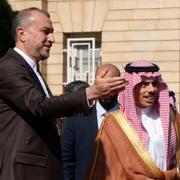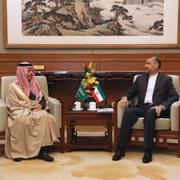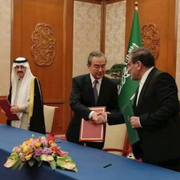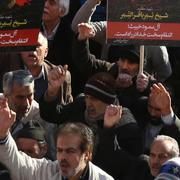
Iran stoppar medborgare från deltagande i Hajj
Inga iranska pilgrimer kommer att kunna åka till årets religiösa högtid Hajj i Saudiarabien, rapporterar AFP. Skälet är att Iran inte anser att Saudiarabien följt landets krav på att höja säkerheten för deltagarna i den religiösa riten. Förra året omkom över 2 000 människor på grund av dåliga säkerhetsarrangemang i samband med riten.
bakgrund
Hajj
Wikipedia (sv)
Hajj eller hadj, arabiska: حج, är den vallfärd till islams heliga stad Mecka som varje frisk vuxen muslim, som har råd, är förpliktigad att göra. Hajj är en av islams fem pelare och den ska göras mellan den 8:e och 12:e dagen i dhu-l-hijjah, den tolfte månaden i den muslimska kalendern. Under dessa dagar vallfärdar miljontals muslimer till Mecka från hela världen. Eftersom den muslimska kalendern är en månkalender och därför inte följer det tropiska året, infaller hajj från år till år på olika datum i den västerländska tideräkningen. En vallfärd som görs under någon annan tid på året kallas umra.
För kvinnor som vill göra hajj och umra finns begränsande regler i sharia som förbjuder kvinnor att resa ensamma. Kvinnan måste följas av en manlig följeslagare (mahram) som kan vara hennes man eller en manlig släkting.
bakgrund
Relationerna mellan Iran och Saudiarabien
Wikipedia (en)
Bilateral relations between the Islamic Republic of Iran and the Kingdom of Saudi Arabia have been strained over different geo-political issues such as the interpretations of Islam, aspirations for leadership of the Islamic world, oil export policy, relations with the United States and the West. Although Saudi Arabia and Iran are both Muslim-majority nations and follow and rule through Islamic scripture, their relations are fraught with hostility, tension and confrontation, due to differences in political agendas that are strengthened for their differences in faith. Saudi Arabia is a conservative "Wahhabi" Sunni Islamic kingdom with a tradition of close ties with the United States and United Kingdom. Iran is a Twelver Shia Islamic Republic founded in an anti-Western revolution. Both Saudi Arabia and Iran are seen to have aspirations for leadership of Islam, and have different visions of stability and regional order. After the Islamic Revolution, relations deteriorated considerably after Iran accused Saudi Arabia of being an agent of the US in the Persian Gulf region, representing US interests rather than Islam. Saudi Arabia is concerned by Iran's consistent desire to export its revolution across the board to expand its influence within the Persian Gulf region -- notably in post-Saddam Iraq, the Levant and within further south in addition to Iran's controversial, much debated nuclear program.
Tensions between the two countries have waxed and waned. Relations between Saudi Arabia and Iran soured particularly after the Iranian Revolution, the nuclear program, the 2011 alleged Iran assassination plot and more recently the execution of Nimr al-Nimr. There have also been numerous attempts to improve the relationship. After the 1991 Gulf war there was a noticeable thaw in relations. In March 2007 President Ahmadinejad of Iran visited Riyadh and was greeted at the airport by King Abdullah, and the two countries were referred to in the press as "brotherly nations". After March 2011, Iran's financial and military support for Syria during the Syrian Civil War, has been a severe blow to the improvement of relations. On January 3, 2016. Saudi Arabia cut diplomatic ties with Iran following the execution of Saudi-born Shia Islam cleric Nimr al-Nimr. The execution prompted widespread condemnation within the Arab World as well as other countries, the European Union and the United Nations, with protests being carried out in cities in Iran, Iraq, India, Lebanon, Pakistan and Turkey. Saudi Arabia's foreign minister said that all Iranian diplomats are to leave the country within 48 hours.
The difference of political ideologies and governance has also divided both countries. The Islamic Republic of Iran is based on the principle of Guardianship of the Islamic Jurists, which holds that a faqīh (Islamic jurist) should have custodianship over all Muslim followers, including their governance and regardless of nationality. Iran's Supreme Leader is a Shia faqīh. The founder of the Iranian revolution in 1979, Ayatollah Khomeini, was ideologically opposed to monarchy, which he believed to be unIslamic. Saudi Arabia's monarchy, on the other hand, remains consistently conservative, not revolutionary, and politically married to age-old religious leaders of the tribes who support the monarchy and the king (namely the Custodian of the Two Holy Mosques) is given absolute obedience as long as he does not violate Islamic sharia law. Saudi Arabia has, however, a Shia minority which has recently made bitter complaints of institutional discrimination against it, specifically after the 2007 change in Iraqi governance and particularly after the 2011 events that spanned the region. At some stages it has gone as far as to call for overthrowing the king and the entire system.
Both countries are major oil & gas exporters and have clashed over energy policy. Saudi Arabia, with its large oil reserves and smaller population, has a greater interest in taking a long-term view of the global oil market and incentive to moderate prices. In contrast, Iran is compelled to focus on high prices in the short term due to its low standard of living given recent sanctions after its decade old war with Saddam's Iraq.
After the Saudi embassy in Tehran was ransacked by Iranian protesters, Saudi Arabia broke off diplomatic relations with Iran on January 4, 2016.
Omni är politiskt obundna och oberoende. Vi strävar efter att ge fler perspektiv på nyheterna. Har du frågor eller synpunkter kring vår rapportering? Kontakta redaktionen



